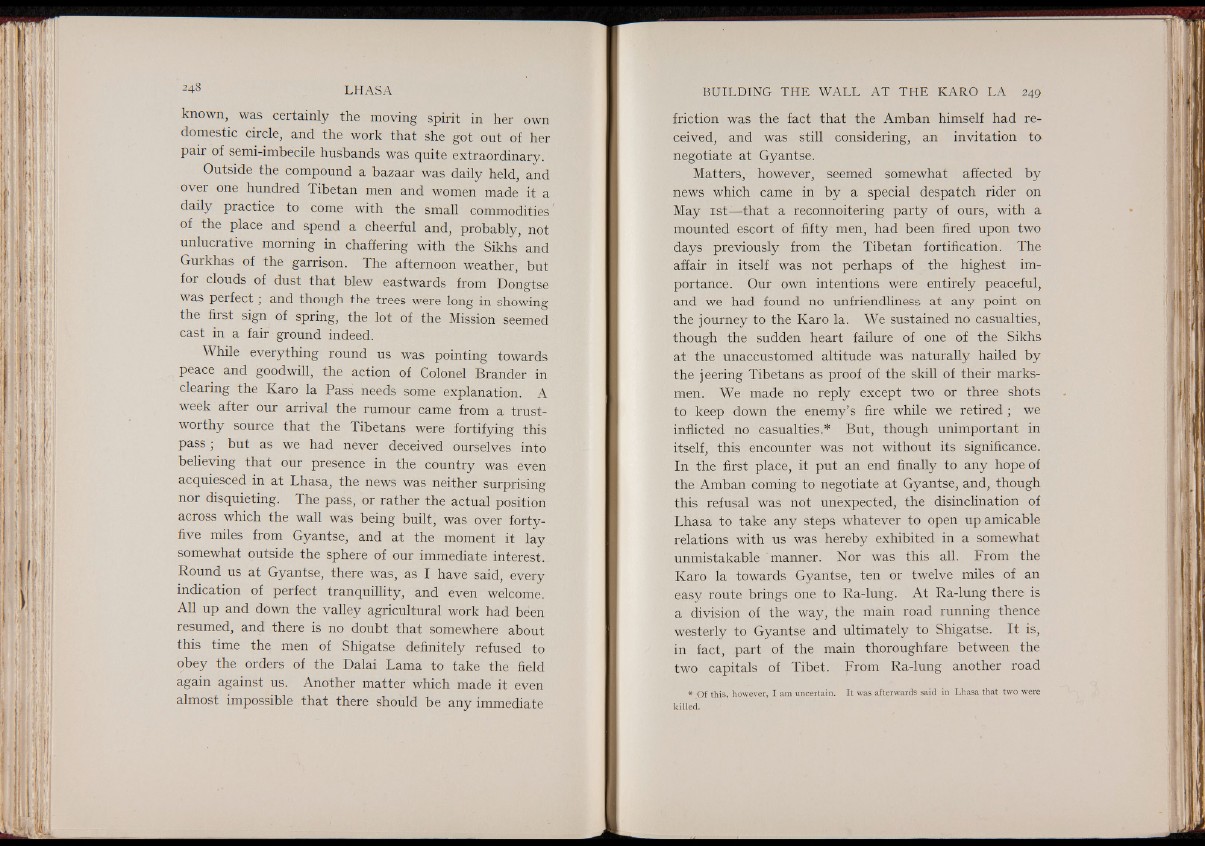
known, was certainly the moving spirit in her own
domestic circle, and the work that she got out of her
pair of semi-imbecile husbands was quite extraordinary.
Outside the compound a bazaar was daily held, and
over one hundred Tibetan men and women made it a
daily practice to come with the small commodities
of the place and spend a cheerful and, probably, not
unlucrative morning in chaffering with the Sikhs and
Gurkhas of the garrison. The afternoon weather, but
for clouds of dust that blew eastwards from Dongtse
was perfect; and though the trees were long in showing
the first sign of spring, the lot of the Mission seemed
cast in a fair ground indeed.
While everything round us was pointing towards
peace and goodwill, the action of Colonel Brander in
clearing the Karo la Pass needs some explanation. A
week after our arrival the rumour came from a trustworthy
source that the Tibetans were fortifying this
pas s ; but as we had never deceived ourselves into
believing that our presence in the country was even
acquiesced in at Lhasa, the news was neither surprising
nor disquieting. The pass, or rather the actual position
across which the wall was being built, was over forty-
five miles from Gyantse, and at the moment it lay
somewhat outside the sphere of our immediate interest.
Round us at Gyantse, there was, as I have said, every
indication of perfect tranquillity, and even welcome.
All up and down the valley agricultural work had been
resumed, and there is no doubt that somewhere about
this time the men of Shigatse definitely refused to
obey the orders of the Dalai Lama to take the field
again against us. Another matter which made it even
almost impossible that there should be any immediate
friction was the fact that the Amban himself had received,
and was still considering, an invitation to
negotiate at Gyantse.
Matters, however, seemed somewhat affected by
news which came in by a special despatch rider on
May 1st— that a reconnoitering party of ours, with a
mounted escort of fifty men, had been fired upon two
days previously from the Tibetan fortification. The
affair in itself was not perhaps of the highest importance.
Our own intentions were entirely peaceful,
and we had found no unfriendliness at any point on
the journey to the Karo la. We sustained no casualties,
though the sudden heart failure of one of the Sikhs
at the unaccustomed altitude was naturally hailed by
the jeering Tibetans as proof of the skill of their marksmen.
We made no reply except two or three shots
to keep down the enemy’s fire while we retired ; we
inflicted no casualties.* But, though unimportant in
itself, this encounter was not without its significance.
In the first place, it put an end finally to any hope of
the Amban coming to negotiate at Gyantse, and, though
this refusal was not unexpected, the disinclination of
Lhasa to take any steps whatever to open up amicable
relations with us was hereby exhibited in a somewhat
unmistakable 'manner. Nor was this all. From the
Karo la towards Gyantse, ten or twelve miles of an
easy route brings one to Ra-lung. At Ra-lung there is
a division of the way, the main road running thence
westerly to Gyantse and ultimately to Shigatse. It is,
in fact, part of the main thoroughfare between the
two capitals of Tibet. From Ra-lung another road
* Of this, however, I am uncertain. It was afterwards said in Lhasa that two were
killed.